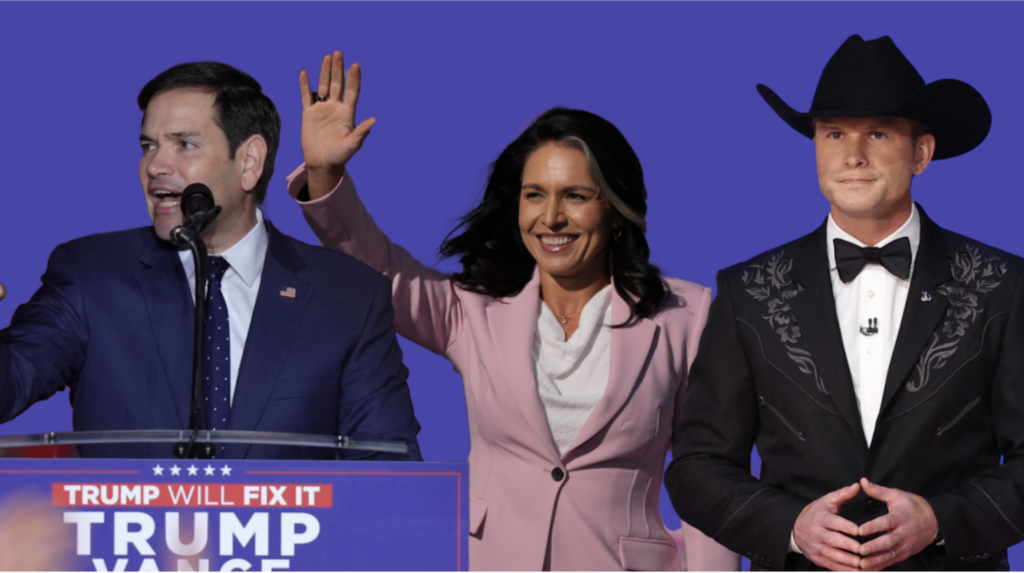Kayla Kouahou ’28

Photo courtesy of Reuters/Anna Rose Layden
As President Donald Trump prepares for his second term in office, he has begun to select members for his new cabinet, many of which have sparked significant controversy. Several of his picks have already drawn criticism, including Robert F. Kennedy Jr. (RFK Jr.) for Secretary of Health and Human Services, Tulsi Gabbard for Director of National Intelligence, and Pete Hegseth for Defense Secretary. In addition, Trump has been particularly popular in the media because of the creation of a new advisory body, the Department of Government Efficiency (DOGE), which aims to cut government spending and streamline bureaucracy. Many of Trump’s choices have sparked heated debates, leaving many to question the direction of the administration’s future policies and what the next four years will hold for all American citizens.
The process of nominating cabinet members involves several stages, beginning with the president’s announcement of nominees. Once the nominations are made, the Senate must confirm the picks through a series of hearings. During these hearings, senators from both parties can question the nominees, often leading to intense disputes. Following the hearings, the Senate votes on whether to approve or reject the nominee. As a result, many of Trump’s cabinet picks are unfinalized currently.
One of the most contentious picks has been Robert F. Kennedy Jr. for the Secretary of Health and Human Services. Kennedy is well known for his outspoken views concerning vaccines and has faced significant backlash from U.S. citizens due to his arguably questionable stance on public health issues. Many contend that his appointment could severely undermine the efforts to address public health crises, especially after many Americans experienced the struggle of the COVID-19 pandemic. On the flip side, supporters of RFK Jr. argue that his advocacy for environmental and health-related causes could bring a fresh perspective to this country, especially concerning environmental health issues.
Another highly debated nomination is Tulsi Gabbard for Director of National Intelligence. Gabbard, a former congresswoman and presidential candidate has been a polarizing figure in politics. Her foreign policy stances along with her criticism of the United States’ involvement in various foreign conflicts, such as when the U.S. became heavily involved in the Syrian civil war in 2014, have raised concerns about her ability to effectively lead the intelligence community. Advocates of Gabbard, however, argue her independent approach and willingness to challenge established norms could help reshape the intelligence body, bringing much-needed change to a too-often opaque group. Young Republicans faculty advisor and Upper School Teacher Michael Whalen expresses his hopes, saying, “I would also like to see individuals who are willing to kind of buck the establishment and implement change because I think that’s something that is sorely needed in our government. I don’t think the direction we’re headed in is a good thing.”
Pete Hegseth, the nominee for Defense Secretary has also been recognized as a more unconventional pick. Hegseth, a Fox News personality and outspoken advocate for conservative military policies, has a history of controversial statements. Hegseth’s supporters believe his leadership in the private sector and commitment to strengthening the U.S. military will be an asset to national defense.
However, opposers have a drastically different view of this character. Along with the scandal in 2017 involving allegations of sexual assault, critics argue his media background along with the lack of formal military experience makes him an unlikely candidate for such a critical position, raising the question of whether loyalty or expertise is more valued in today’s government.
Student leader of Young Democrats Cassidy Ott ’25 says, “Expertise matters more…you’re choosing these people to run these departments and it’s an important job, so I think whatever loyalty there is, it shouldn’t be the main deciding factor.” However, student leader of Young Republicans Jack Signor ’26 believes both are essential, stating, “I think in a perfect world, cabinet [members] would be chosen for both their loyalty and experience. However, one thing history has taught us is both parties have leaned towards loyalty instead of experience.”
While these cabinet nominations have been divisive, another element of Trump’s second-term plans is the creation of the Department of Government Efficiency, or Doge. Led by CEO of Tesla Motors Elon Musk and founder of Roicant Sciences Vivek Ramaswamy, the department aims to reduce government debts by cutting spending and eliminating inefficiencies within the bureaucracy.
Young Democrats faculty leader Dr. Melanie Subacus shows her concern for the creation of DOGE, stating, “I’m always a little cautious about creating a thing to cut something…you’re creating more to find ways to do less, and so there’s some tension there.” Many believe that DOGE’s focus on cutting spending could lead to harmful budget cuts in vital components of government, like the Department of Education, while supporters believe it will fulfill its goal of fostering a more efficient and cost-effective government.
As these nominations move forward, questions about the qualifications and ideologies of the appointees will continue to dominate the public discourse. Some argue that Trump’s picks are too polarizing and could contribute to further division in the country. In contrast, others claim these possible appointments will bring a fresh perspective to the government. Regardless, these controversial picks will ultimately continue to fuel debates about the future of the U.S. government and the political landscape in the coming years.